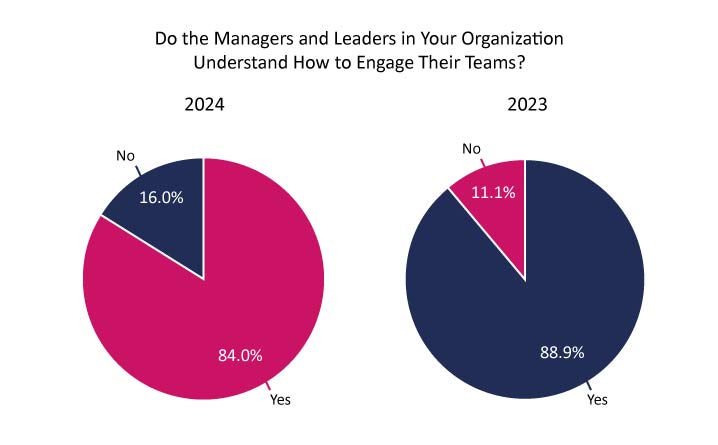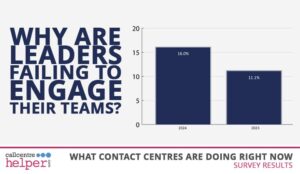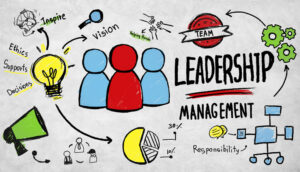As contact centres grapple with the long-term effects of hybrid working and post-pandemic disconnection, the ability of leaders to truly engage their teams has become a crucial challenge.
In a recent discussion hosted by Call Centre Helper’s very own Xander Freeman, Kay Littlehales (LittleHales Consulting) and Garry Gormley (FAB Solutions) delved into the changing dynamics of leadership in 2024.
The Great Disconnection
Littlehales started by addressing the importance of “intentional leadership”. Contact centre leaders today, she said, are heavily focused on KPIs and task completion, but are missing the critical behaviours that foster deep, long-term engagement.

She explained that leadership today has become too transactional, particularly in the aftermath of the pandemic, where routines were disrupted, and behaviours became more robotic.
Instead of focusing solely on tasks, Littlehales advocated creating space in leadership for coaching, feedback, and personal development.
This, she argued, would foster a culture of trust and engagement within teams.
Gormley added to this by referencing a significant statistic from Call Centre Helper’s 2024 survey.

A stark 47% of employees felt their managers or leaders did not give them constructive feedback on their performance.
This figure is a clear reflection of the growing gap between leadership and employee engagement, one that has widened in recent years.
Gormley emphasized that trust plays a crucial role in bridging this gap, and that contact centre employees need to feel valued and motivated to perform at their best.
This led to a deeper conversation about the psychological and emotional wellbeing of employees, especially in the post-pandemic world.
Contact centre leaders need to be open about their own challenges, which creates an environment where employees feel safe to share their own struggles, without fear of being judged or penalized.
Gormley and Littlehales agreed that the modern workplace has fostered a “great disconnection” – a term Gormley used to describe how, despite being more connected through technology, people are feeling increasingly disconnected on a human level.
Hybrid working has only exacerbated this issue, as leaders now rely heavily on emails and virtual meetings, further distancing themselves from their teams.
The key to overcoming this, they stressed, is “vulnerability”. Contact centre leaders need to be open about their own challenges, which creates an environment where employees feel safe to share their own struggles, without fear of being judged or penalized.
This concept, referred to as “psychological safety”, was framed as essential for high-performing teams.
Leading by Example
Littlehales moved on to “effort leadership”, where the level of effort a contact centre leader demonstrates has a direct impact on their team.
If a leader is seen actively engaging in self-improvement and wellbeing, this behaviour will naturally influence their team.
Self-care and personal development are critical not just for the individual leader, but for setting the tone within a team.
She implored the audience to ask themselves: “When was the last time you did something for yourself as a leader?”
Self-care and personal development, Littlehales said, are critical not just for the individual leader, but for setting the tone within a team.
When it comes to managers giving feedback, Littlehales highlighted the risk of relying too much on digital communication.
She noted that many leaders today lead through email, which can easily be misinterpreted and lacks the personal touch necessary for meaningful communication.
As she put it, “people do not respond to an email”, emphasizing the need for more direct and personal interaction, especially when discussing performance and development.
If you are looking to improve your communication and make sure you engage properly with your teams, read our article: The 7 Cs of Effective Communication

Gormley brought the conversation full circle by emphasizing the importance of “psychological safety”.
He highlighted how external pressures, such as the cost of living crisis, have affected contact centre employees’ mental health, making it even more important for leaders to create environments where employees can openly discuss their challenges.
Vulnerability, trust, and honest conversations, he argued, are the pillars of building engaged teams.
As the session concluded, both Gormley and Littlehales called on contact centre leaders to re-evaluate how they engage with their teams.
Whether through intentional leadership, vulnerability, or effort, the message was clear: leaders need to be more present, more personal, and more invested in their teams’ wellbeing if they want to foster high-performing cultures.
Watch the Interview Now
If you want to see more insights from Garry and Kay, just watch the video below:
Our annual survey is a crucial resource for the contact centre industry, offering key insights and trends across various areas such as Advisor Experience, Artificial Intelligence, Customer Experience, and Workforce Management.
This year’s survey, run in partnership with Five9, Jabra, NICE, Sabio, Scorebuddy, and Zoom, highlights the latest strategies and challenges shaping the future of contact centres.
Download the full report for free: What Contact Centres Are Doing Right Now (2024).
If you are looking for more information on some of the topics mentioned in this article, read these next:
- 9 Ways to Create a Thriving Contact Centre Culture
- The 10 Pillars of EX (Employee Experience)
- 9 Traits of High-Performing Team Leaders
- Kick-Start Your Next Team Engagement Day
Author: James Groves
Reviewed by: Xander Freeman
Published On: 25th Nov 2024 - Last modified: 4th Dec 2024
Read more about - Call Centre Management, Employee Engagement, Garry Gormley, James Groves, Leadership, Survey, Team Management



































